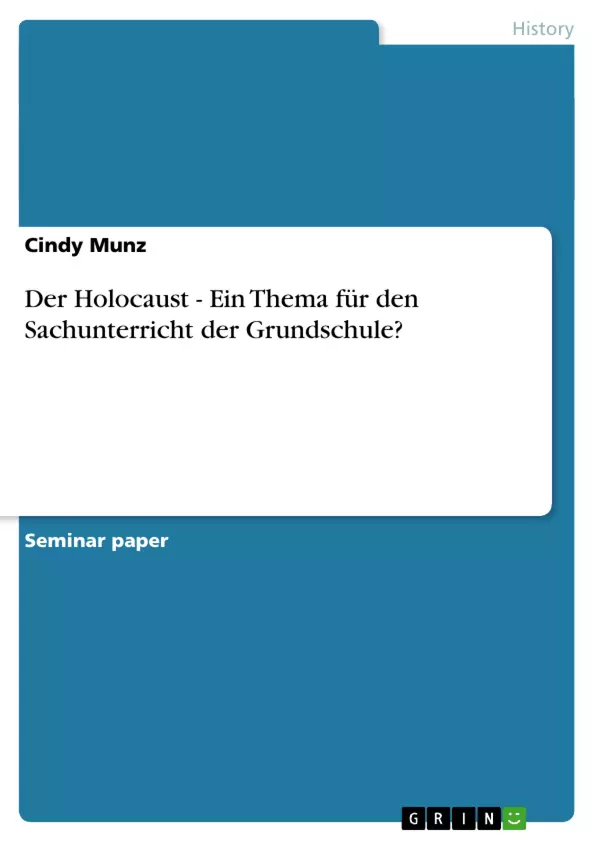Der Holocaust stellt für die Geschichte nach dem Zweiten Weltkrieg (1939-1945) ein zentrales Thema dar. Wenn es um die Festlegung der deutschen Identität nach 1945 geht, so wird immer wieder – direkt oder indirekt – Bezug auf dieses Thema genommen. Deshalb ist die Frage, ob der Holocaust bereits in der Grundschule zur Themenauswahl stehen sollte, keineswegs rhetorisch. Auch wenn mittlerweile knapp 60 Jahre seit diesem Völkermord verstrichen sind, ist dieses Thema für uns allgegenwärtig. Sei es beispielsweise durch die Medien, die über die Verwüstung jüdischer Friedhöfe oder die Gewalt von Rechtsradikalen gegenüber Ausländern, berichten. Jedoch wird immer wieder versucht, dieses „Thema von […] Kindern fernzuhalten“ und zu tabuisieren. Der Philosoph und Soziologe Theodor W. Adorno formulierte in Bezug darauf folgendes Ziel von Erziehung:
„Die Forderung, dass Auschwitz nicht noch einmal sei, ist die allererste an Erziehung. Es […] war die Barbarei, gegen die alle Erziehung geht. […] Da aber die Charaktere insgesamt […] nach den Kenntnissen der Tiefenpsychologie schon in der frühen Kindheit sich bilden, so hat Erziehung, welche die Wiederholung verhindern will, auf die frühe Kindheit sich zu konzentrieren.“
In der vorliegenden Arbeit stellt sich nun die Frage, inwieweit die Grundschule dies erfüllen oder einen Beitrag dazu leisten kann. Abgesehen davon gilt es zu diskutieren, ob und auf welche Art und weise Kinder bereits im Grundschulalter mit dem Thema Holocaust konfrontiert werden und welches die Ziele einer Erziehung sein sollen, die eine Verhinderung eines „zweiten Auschwitz“ zum Hauptziel hat.
Inhaltsverzeichnis (Table of Contents)
- Einleitung
- Die Aufgabenbereiche des Sachunterrichts in der Grundschule
- Historisches Lernen im Sachunterricht der Grundschule
- Der Sinn des historischen Lernens in der Grundschule
- Historisches Lernen in Bezug auf politisches und soziales Lernen
- Die Ziele des historischen Lernens in der Grundschule
- Das Thema „Holocaust“ in der Grundschule
- Die Ziele des historischen Lernens in der Grundschule zum Thema „Holocaust“
- Der „Holocaust“ - ein Tabuthema?
- Das Thema „Holocaust“ im Bildungsplan für die Grundschule
- Das Kompetenzfeld „Raum und Zeit erleben und gestalten“
- Das Kompetenzfeld „Heimatliche Spuren suchen, entdecken, gestalten“
- Fazit
Zielsetzung und Themenschwerpunkte (Objectives and Key Themes)
This work examines the suitability of teaching the Holocaust in German elementary schools. It explores the role of history education in elementary schools, focusing on the objectives and challenges of addressing such a sensitive and complex topic with young children. The paper also analyzes the relevant sections of the Baden-Württemberg curriculum to determine how the Holocaust might be integrated into the existing framework.
- The role and objectives of history education in elementary school.
- The challenges and considerations of teaching the Holocaust to young children.
- The integration of the Holocaust into existing elementary school curricula.
- The potential benefits and drawbacks of including the Holocaust in elementary school education.
- Pedagogical approaches for sensitively addressing the Holocaust in the elementary school context.
Zusammenfassung der Kapitel (Chapter Summaries)
Chapter 1: Einleitung (Introduction): This chapter introduces the central question of whether the Holocaust should be a topic in elementary school, highlighting its significance in German post-war identity formation and the ongoing debate surrounding its inclusion in the curriculum. It also briefly touches upon the views of Theodor W. Adorno on the importance of early childhood education in preventing the recurrence of such atrocities.
Chapter 2: Die Aufgabenbereiche des Sachunterrichts in der Grundschule (The Tasks of Elementary School Subject Studies): This chapter outlines the goals and functions of elementary school subject studies in Baden-Württemberg, drawing from the 2004 curriculum. It emphasizes the integration of students' prior experiences and the development of their understanding of their natural and cultural environment.
Chapter 3: Historisches Lernen im Sachunterricht der Grundschule (Historical Learning in Elementary School Subject Studies): This chapter delves into the purpose and goals of historical learning in the elementary school setting, examining its connection to political and social learning.
Chapter 4: Das Thema „Holocaust“ in der Grundschule (The Topic of the Holocaust in Elementary School): This chapter focuses on the specific aims of teaching the Holocaust in elementary school and explores whether it is considered a taboo topic.
Chapter 5: Das Thema „Holocaust“ im Bildungsplan für die Grundschule (The Topic of the Holocaust in the Elementary School Curriculum): This chapter examines the Baden-Württemberg elementary school curriculum's relevant sections pertaining to the Holocaust, specifically focusing on the competencies of “experiencing and shaping space and time” and “seeking, discovering, and shaping traces of home”.
Schlüsselwörter (Keywords)
Holocaust education, elementary school curriculum, Germany, historical learning, child development, sensitive topics, pedagogical approaches, Baden-Württemberg, post-war identity, taboo.
Frequently Asked Questions
Should the Holocaust be taught in elementary schools?
The paper explores this sensitive question, noting that while it is often considered a taboo, early education is crucial to prevent the recurrence of such atrocities, as argued by Theodor W. Adorno.
What are the goals of Holocaust education for young children?
The primary goals are historical learning, fostering social and political awareness, and developing a sense of responsibility to prevent future human rights violations.
How does the Baden-Württemberg curriculum address the Holocaust?
The curriculum integrates relevant themes through competency fields like "Experiencing space and time" and "Seeking traces of home," allowing for age-appropriate historical exploration.
What are the pedagogical challenges of teaching this topic?
Challenges include balancing the horrific nature of the events with child development needs, avoiding overtaxing the students, and breaking through societal taboos.
Why is early childhood character formation relevant to this topic?
According to Adorno and deep psychology, character is formed early. Therefore, education aimed at preventing a "second Auschwitz" must focus on these early years to instill values of tolerance and openness.
- Quote paper
- Cindy Munz (Author), 2007, Der Holocaust - Ein Thema für den Sachunterricht der Grundschule?, Munich, GRIN Verlag, https://www.grin.com/document/120687



